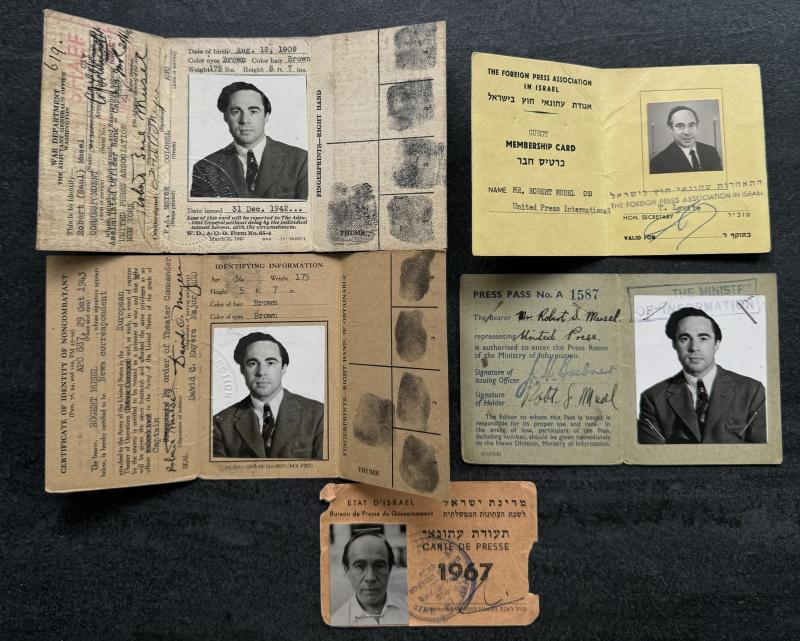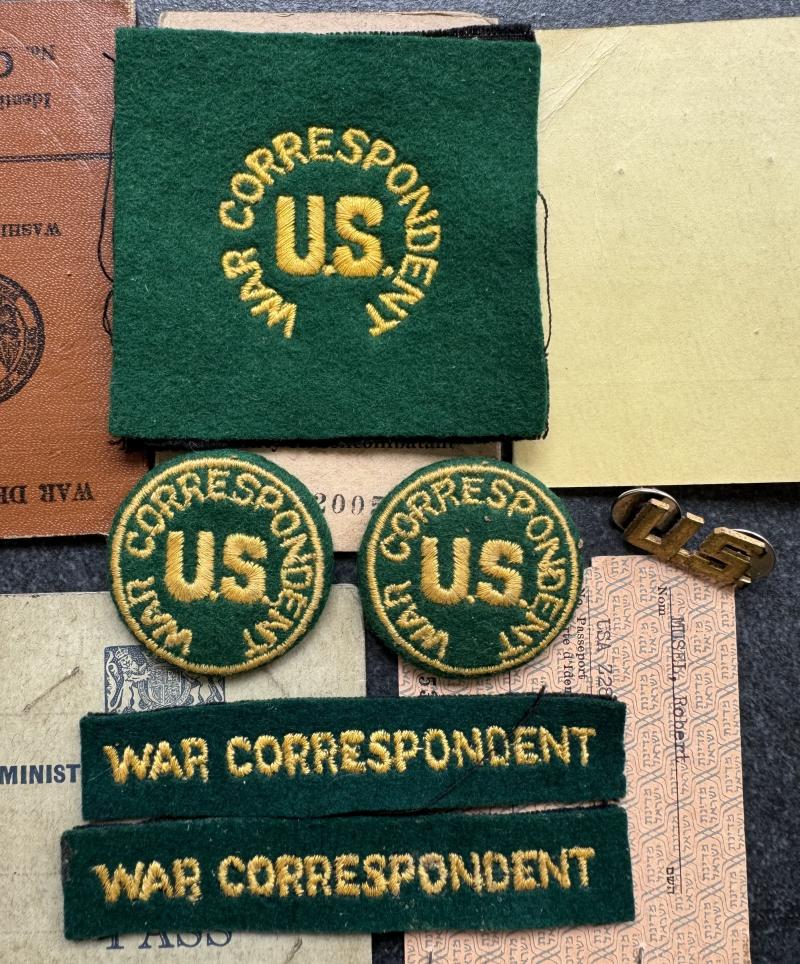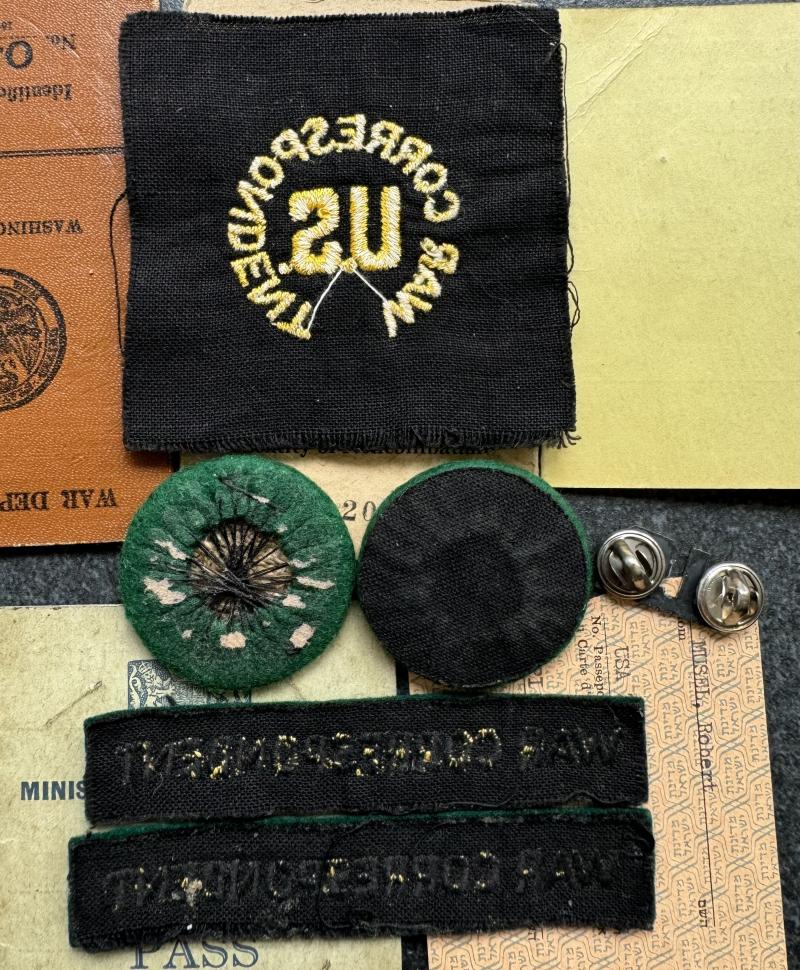Historically Important Group to US War Correspondent Robert Musel
Bob Musel came to London in 1943 as a UP war correspondent and remined in London for the rest of his life. He covered five major World War II campaigns, won a citation from Gen. George Patton at the Battle of the Bulge, and added numberless hairbreadth escapes to his limitless fund of stories.
He told these stories with the wit and humor of a natural raconteur -- stories of informing Winston Churchill of Franklin D. Roosevelt's death, of bounding alongside English Channel swimmers, of the Berlin airlift, of heading for the front in the Six-Day War still in his business suit, of giving Bing Crosby the nickname "Der Bingle" in a wartime feature.
A blocky bear of a man -- he did bodybuilding exercises into his 70s -- he was never a name-dropper for effect. His private friendships with figures like Prince Rainier of Monaco and the Duke of Windsor were concealed rather than flaunted.
He had a spell as a Hollywood script writer, and claimed to be the inspiration for a characer in "The Front Page". True or not, he lived up to the image of Ben Hecht's newspaperman -- fast-moving, wisecracking, intoxicated by words and by the story.
Stories about him are as numerous as those by him. Covering the Lindberg baby kidnap and subsequent murder trial, for instance, he was consistently "beaten" by the opposition. "But they've got Damon Runyon covering for them," the young Musel complained. "What am I supposed to do?" Came the reply: "Outwrite him."
Musel had an uncanny eye for the unusual or the telling detail. Face-to-face with his first H-bomb, he noted that the American airmen handling the awesome weapon never called it by name. So he wrote an entire feature about "it," "the thing," "the Big One" which never used the words "hydrogen bomb".
He was a model for generations of Unipressers for his alliterative or literary leads or his long rythmical cadences in the great descriptive set pieces for which he was best known.
In his mid-80s, Bob Musel suffered a stroke which largely paralyzed his right side and left him frustratingly halt of speech. The burden of care fell upon his wife, the former Jill Carlyle, whom he married in 1962 and who survives him.
Obituary:
Robert Musel, a journalist who reported for a worldwide readership on everything from the Lindberg baby murder trial to the London Blitz to the funeral of Princess Grace of Monaco, died Wednesday (Sept. 9, 1999) in a London hospital. He was 90.
Musel was a legend in his profession for the brilliance of his writing and the breadth of his experience. He was among the last of "The Front Page" shoe-leather, typewriter-bashing reporters, and covered a bewildering variety of the major events of the century.
He was also a lyricist whose songs were among the most popular of their time -- songs like "Pappa Piccolino" and "Band of Gold," which won a "Million Performances" award.
Born in New York Aug 13, 1909, Robert Saul Musel (he never used or even alluded to his middle name) sold his first song lyric (for $5) at the age of 14. He joined United Press (later United Press International) in 1927 as a copy boy, and was a bureau manager within a year (learning later all the contracts he signed were illegal because he was a minor). UPI, which grew into the world's second largest news agency, circulated his material to thousands of newspapers and radio stations in scores of countries aroiund the globe, and Musel stayed as a UPI senior editor long past normal retirement age.
He never did retire from Broadcast Music Inc., an American performing rights society, and was still BMI's senior European consultant at his death. In 1993 BMI established the Robert Musel Award for the year's most-performed song, recognizing his contribution to the music industry - as did Musel's Gold Badge Award from the British Academy of Songwriters, Composers and Authors. Musel was still writing song lyrics into his 80s.
But reporting was his first and major love. As a news agency journalist he specialized in everything, and his range was hard to comprhend, let alone surpass. In 1972, when Musel was a mere 63, a UPI executive wrote:
"Musel, without exaggeration, has reported and written everything -- science, television, sports, politics, crime, entertainment. And he interviews everyone imaginable.
"Assign him to cover a wedding and you'll never want to assign anyone else -- so he covered Elizabeth's to Philip (returning down the aisle, Philip caught Bob's eye and winked), Margaret's to Tony, Grace's to his friend Rainier, Baudoin's to Fabiola, Jackie Kennedy to Bob's old acquaintance Ari Onassis. He covered a major funeral once, so was assigned to those of King George VI, Churchill, DeGaulle, the Duke of Windsor and many others.
He covered a trial once, and instantly became our specialist for trials of mass murderers like Christie, Haig, Neville Heath and atom spies like Klaus Fuchs.
"He's covered at least one major story in every country in Europe, most of those in Africa, and there are few places in the U.S. he hasn't been on a story. Heavyweight title fights, Queen Elizabeth's coronation, a dozen Wimbledon championships, every war in sight (five in all), a half-dozen Olympic Games -- there is no type of story Musel has not done."
And he went on for more than a decade after that with undiministed energy and flare, dominating the little-understood world of news agency journalism.
Agency journalism above all requires speed -- UPI's motto was "A deadline every minute". But writing quality was taken more seriously by "Unipressers", perhaps, than by other wire services. Especially writing "the lead" -- the introductory paragraph which grabs a reader's interest and sets the story's sense of rythym.
Code: 52
2000.00 GBP




